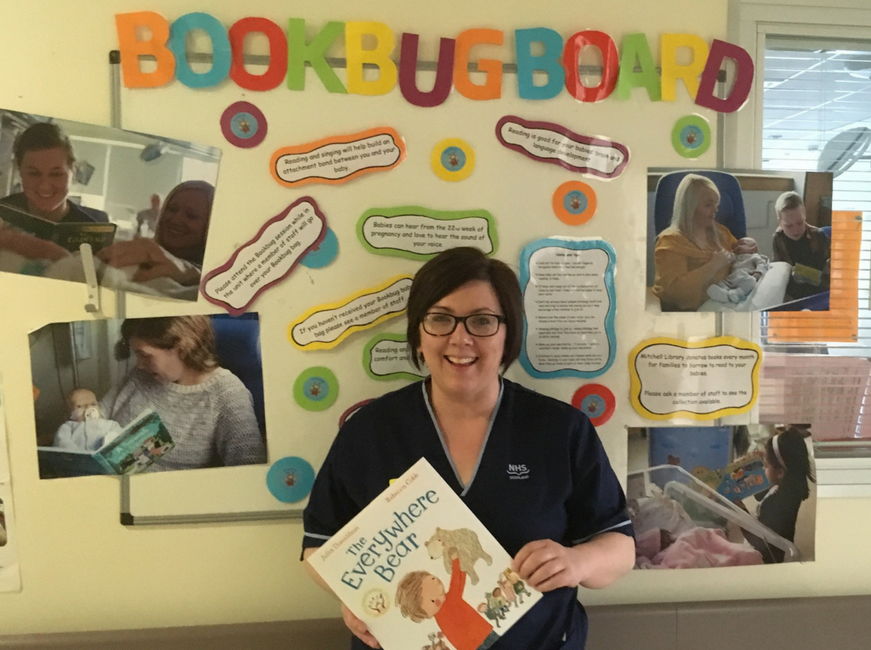Tips for encouraging reading in the NICU from RHC Nurse Tracy Clinton
01 March 2018

Tracy Clinton is a Senior Charge Nurse in the Neonatal Unit at the Royal Hospital for Children in Glasgow. The unit recently introduced a new reading programme for parents and babies on the unit, here she tells us about it.
In December we launched a wonderful partnership with the Scottish Book Trust and the Royal Hospital for Children in Glasgow to bring their Bookbug programme to our NICU.
Bookbug was an already very well established programme in Scotland, where books and information about reading, songs and rhyme are gifted to every child in Scotland from birth to their first year at school. All babies should receive these bags from their health visitor but many NICU babies were missing out as they had spent a long time in hospital.
With help from The Scottish Booktrust we set about to change that by adding a bespoke neonatal aspect to their Bookbug baby bags, so that parents could be gifted a bag with the books but also receive information leaflets about the importance of reading, talking and singing to their baby in a NICU environment. To enhance this further, families can pop along to an informal Bookbug parent awareness session run by HUGG (the Helping Us Grow Group). This session informs them of the benefits of reading, singing and talking, and usually involves tea and cake.
Another aspect of the programme is staff training. On our Bookbug launch day, we held a drop in session so that staff could familiarise themselves with the Bookbug baby bags in advance and to ensure that everyone was aware of the benefits associated with the reading programme, so that knowledge could be filtered down to parents. We have another training day organised in March, where we’ll be joined by our new volunteers from our Glasgow Children’s Hospital Charity. They will be helping us to distribute the bags to parents, we’re very lucky to have them.
Why do you think reading programs are necessary in a neonatal environment?
Neonatal reading programmes are necessary because of the profound positive effect they have on both babies and their families. When a baby is first admitted to NICU, the normal interactions that occur between them and their parents are interrupted and through no choice of their own, families are forced into a highly stressful, high tech, clinical environment. It is an extremely challenging time for them all, so encouraging parents to read, talk or sing to their baby is a way to help alleviate some of that stress.
It is known that babies are affected by the quality of sound that they hear. From just 22 weeks gestation the baby can recognise the sound of their mother's voice in the womb. Whether the baby is born term or preterm the familiar sound of that voice has a calming effect on the baby. The positive sound of voice, especially from mum also helps to detract from any of the negative sound from background noises the baby is experiencing like alarms, ventilators and high flow devices. Through reading, talking or singing, mum and dad are making their presence known to their little one. This helps to promote bonding and attachment. Parents have reported feeling a greater sense of normalcy after spending time reading their little one a story.
I personally feel that in the NICU environment it is part of our role as healthcare professionals to give guidance and information to parents about the benefits of interactions such as reading, singing and talking so that they may be encouraged and gain the confidence to do these at their babies cotside. It's important for parents to understand that this will make a difference to their baby in the long-term as the words that they hear spoken to them now will help baby's brain and language development in the future. The more words they hear the better.
What advice would you give to other neonatal units setting up a reading programme of their own?
The team at the Scottish Booktrust have be instrumental in helping us bring a reading programme to our NICU. So much has been achieved with their dedication, expertise and help. The best advice I could give is have a vision and research what you want to do and why. Don’t be afraid to approach outside agencies as there are those who are just as passionate about early years literacy and development and already do it well. Get families involved too.
Do you have and recommendations on what to read in the NICU?
There is nothing more lovely than hearing a baby being read too. I have listened to babies being read the complete Harry Potter series by grandpa, Dr Seuss by dad, Guess How Much I Love you by mum and of course the Gruffalo by little sis. Nurses all have our favourites too.
For me, it would be Each Peach Pear Plum by Janet and Allan Ahlberg. A timeless picture book that has all the classic nursery rhyme characters involved in a great wee rhyming story. It’s beautifully illustrated and it’s one that is soon remembered off by heart. This book was always a favourite of my own children who always wanted to hear it over and over again. It’s a perfect read for NICU as repetition and rhyme are good for long term language development. Bookbug have a song and rhyme library on their website if you are ever looking for some inspiration.
My next recommendation has got to be a storybook by the wonderful Julia Donaldson. The Monkey Puzzle is illustrated by the talented Axel Scheffler. A little Monkey has lost their mum and a little butterfly sets out to help to find her. Again a great little rhyming story, but one that puts a little smile on your face. Rhyming stories are good as these can help develop communication skills from a young age.
